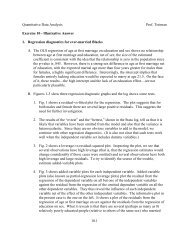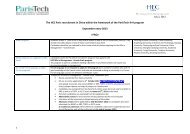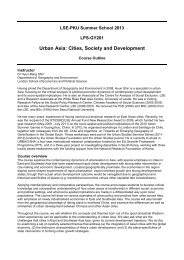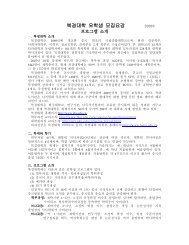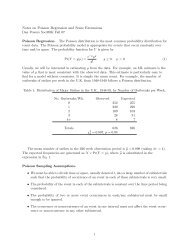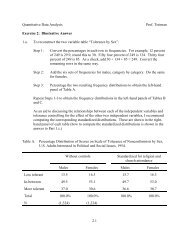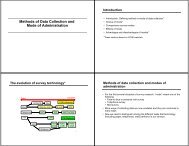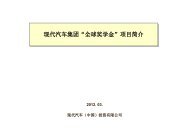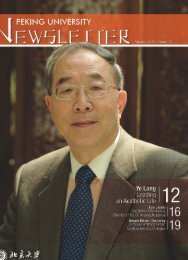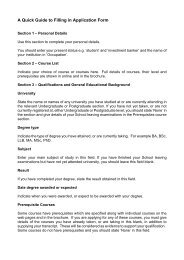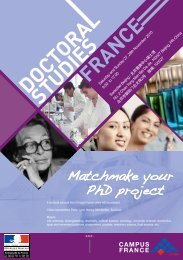LSE-PKU Summer School 2013 Brochure
LSE-PKU Summer School 2013 Brochure
LSE-PKU Summer School 2013 Brochure
Create successful ePaper yourself
Turn your PDF publications into a flip-book with our unique Google optimized e-Paper software.
LPS-IR203 Power Shift The decline of the West and<br />
the new international relations of the 21st century<br />
13<br />
About the Instructor<br />
Professor Zhang Shiqiu is Professor<br />
of Environmental Economics<br />
and Director of the Institute of<br />
Environment and Economy at the<br />
College of Environmental Sciences<br />
and Engineering, Peking University.<br />
She obtained her Bachelor of Economics and PhD in<br />
Environmental Management from Peking University.<br />
She teaches environmental economics and conducts<br />
research related to environment and development<br />
issues, including environmental and resource economics,<br />
environmental policy and environmental management.<br />
Her research projects have focused on the economic<br />
analysis of a multiple pollutants control strategy, regional<br />
management and policy evaluation, as well as air quality<br />
control, including for the 2008 Beijing Olympic Games.<br />
She is the senior expert member of the United Nations<br />
Environment Programme’s Technology and Economic<br />
Assessment Panel for implementing the Montreal Protocol,<br />
and co-chair of the Task Force for Replenishment of the<br />
Multilateral Fund of the Montreal Protocol. She has won<br />
numerous Chinese and international awards for her<br />
contribution to environment studies.<br />
For over five hundred years the international order has<br />
been shaped by the overwhelming military and economic<br />
superiority of the West. But the world is not static. Nothing<br />
lasts for ever under conditions of globalisation; and since<br />
the turn of the new century, economists like Danny Quah<br />
and Jim O’Neill, and geopolitical thinkers such as Niall<br />
Ferguson and Paul Kennedy, have begun to rethink the<br />
future shape of the world order. Their conclusions are as<br />
intellectually arresting as they are globally significant: the<br />
old western world – they argue – is fast losing its privileged<br />
position as new actors, most notably but not only in Asia,<br />
begin to assert themselves. As a result, one of the greatest<br />
power shifts in history is underway with consequences<br />
that could prove to be as critical to international affairs<br />
in the 21st century as the final triumph of Europe was in<br />
the nineteenth and America in the twentieth.<br />
In this exciting course, two globally renowned thinkers<br />
from the <strong>LSE</strong> who have been teaching on the <strong>LSE</strong>-<strong>PKU</strong><br />
<strong>Summer</strong> <strong>School</strong> for many years, explore the contours of<br />
the new international system in the making by seeking<br />
to provide original answers to ten key questions that will<br />
be discussed over the ten meetings.<br />
Each session will be accompanied by a specific reading.<br />
Students are also encouraged to read at least one of<br />
the more general texts suggested on the course outline.<br />
About the instructors<br />
Professor Michael Cox was<br />
appointed to a Chair in International<br />
Relations at <strong>LSE</strong> in 2003 and<br />
previously held appointments in<br />
Northern Ireland, Wales, the USA<br />
and Australia. More recently he was<br />
appointed Director of the Cold War<br />
Studies Centre at <strong>LSE</strong>, and in 2007 Co-Director of <strong>LSE</strong><br />
IDEAS, a centre for the study of diplomacy and strategy. He<br />
has held external positions at Chatham House, London, the<br />
Nobel Institute in Oslo, the Royal Institute of International<br />
Affairs and the Royal United Services Institute.<br />
A highly experienced international lecturer, he speaks<br />
on a range of contemporary global issues, though most<br />
recently he has focused on US foreign policy, the state of<br />
transatlantic relationship, the role of the United States in<br />
the international economy, the rise of Asia and the longer<br />
term problems facing the European Union.<br />
Professor Arne Westad is Professor<br />
of International History at the London<br />
<strong>School</strong> of Economics and Political<br />
Science (<strong>LSE</strong>) and an expert on the<br />
history of the Cold War era and on<br />
contemporary international affairs.<br />
He co-directs <strong>LSE</strong> IDEAS, a centre for<br />
international affairs, diplomacy and strategy, is an editor<br />
of the journal Cold War History, and a general editor of<br />
the forthcoming three-volume Cambridge History of the<br />
Cold War. Professor Westad lectures widely on China’s<br />
foreign affairs, on Western interventions in Africa and<br />
Asia, and on foreign policy strategy.<br />
Before joining <strong>LSE</strong>, he taught at the University of North<br />
Carolina and at Johns Hopkins University, and served for<br />
eight years as Director of Research at the Nobel Institute<br />
in Oslo. Additionally, he has held visiting fellowships at<br />
University of Cambridge, University of Hong Kong and<br />
New York University. In 2000, Professor Westad was<br />
awarded the Bernath Lecture Prize from the Society of<br />
Historians of American Foreign Relations.



